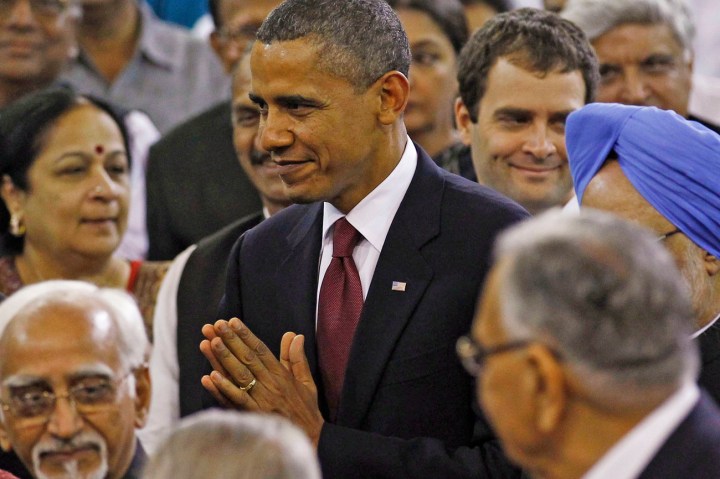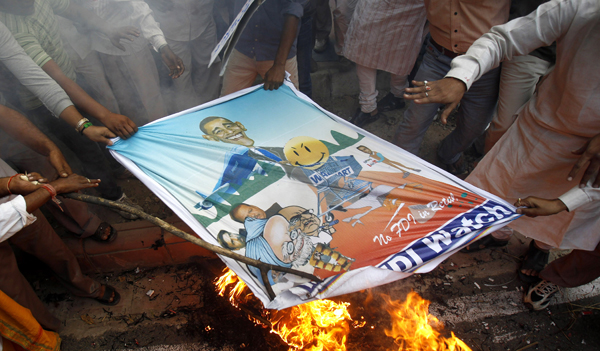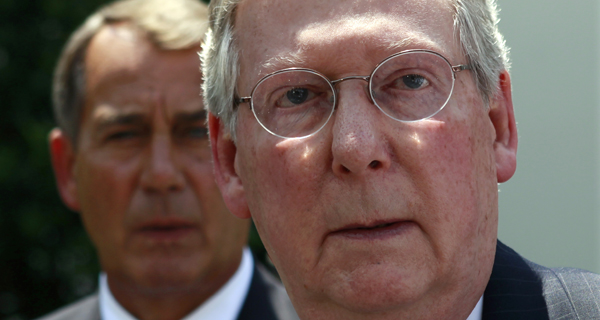Politics
Obama in Asia – with one eye back on Washington

Viewers of the wildlife TV channels know the pattern. A pack of predators corners and tries to bring down a great elk, a wildebeest or even a giraffe. One of the predators darts in ahead of the pack, distracting the would-be prey and allowing the others to move in closer for the kill. This pattern may become intimately familiar over the next two years to a different kind of would-be prey - Barack Obama. By BROOKS SPECTOR.
Following Barack Obama and the Democrats’ “shellacking” on election day, Senate Republican minority leader Mitch McConnell told everyone who would listen that making Barack Obama a one-term president is his – McConnell’s –number one job. And one of the stranger members of the House of Representatives, Minnesota Republican Congresswoman Michelle Bachmann, has been insisting that Obama’s current trip to India, Indonesia, South Korea and Japan is costing the American taxpayer more than the entire war in Afghanistan, each day. As crazy as it is, it’s a cry that may embolden other Republicans to attempt to move in closer on their favourite prey.
It’s virtually impossible to figure out where, exactly, she found this figure, although she may have drawn on some breathless commentary in the Indian press that may have added up every kind of local Indian cost for Obama’s visit, plus the salaries and costs of the travelling White House, plus the salaries and travel costs of the big group of industry figures joining Obama on his visit to India – and then multiplying the resulting number by a couple of orders of magnitude, just to make sure it was a really big, really impressive number. Almost inevitably, broadcasters like Rush Limbaugh have repeated this charge to lambaste Obama for being profligate with the national treasury – and the tax dollars of long-suffering citizens – for some kind of extended family vacation to Obama’s Islamic “homeland” of Indonesia.
Actually, of course, this international trip is much less sinister and much more interesting than Obama’s detractors would like. Like most world leaders, any modern American president travels a lot. There is a yearly calendar of symbolically and substantively important international meetings like the G8/G20 sessions, the Apec Forum, and Nato summits, as well as a clutch of bilaterals. And then there are those trips that are the tools to advance a faltering relationship or halt the skidding of another one.
During his first two years, Barack Obama’s initial overtures to China, the new, emerging global superpower, seems to have slightly crossed some wires along the way. Instead of finding easy complementarities for two countries with their enormous and growing trade ties, increasingly intertwined international financial relationship and a mutual interest in the protecting the safety of the world’s commerce routes, the US-China relationship has instead been rattled by a range of disputes. There are trade protectionism charges and muttering that the exchange value of the Chinese currency is artificially maintained, and most recently, accusations (by China and others) that the US is trying to devalue its currency through “quantitative easing”. Moreover, there has been an increasingly visible, acrimonious public scuffle about the intentions of Chinese power projection into those maritime areas adjacent to the Pacific Ocean or in waters between the Pacific and Indian oceans.
A quick look at a map offers a possible insight into the geopolitics (and economics) of Obama’s current trip. The stops encompass the four biggest economies surrounding China – India, Indonesia, South Korea and Japan – and each of these has had sometimes-problematic relations with China, to say the least.

Photo: Activists of Swadesh Jagaran Manch group burn an effigy and a banner of U.S. President Barack Obama during a protest against his visit to India, in New Delhi November 8, 2010. Hundreds of activists on Monday protested against the government’s policy to open the retail sector for multi-national companies in context of Obama’s visit to India. REUTERS/Adnan Abidi
With more than a billion people, India is China’s great contemporary rival as the major Asian growth economy, and its relationship with America has become increasingly close within the past decade. In fact, a recent cover story in The Economist argued that, over the long term, India would move past China.
Over the past decade, India has become the great electronic back office for America. And the 2008 US-India nuclear treaty has further opened the door for investment and trade in many economic sectors. With its 300 million or so members of a new middle-class, India is a huge potential target for US exports as well. The economic aspects of the relationship are such that Obama’s first port of call was the commercial capital of Mumbai and not the political capital of New Delhi.
But a half-century on, India remains troubled by memories of its military defeat at the hands of China in the 1962 border war. At present, India is again concerned about what it sees as Chinese encroachments on the Indian border regions and its growing involvement with India’s “near abroad” of neighbouring nations like Nepal and Bhutan, or even Bangladesh. Then, of course, there are Indian concerns about drift or worse in Pakistan and the direction of the ultimate resolution of America’s involvement in Afghanistan, scheduled for the end of next year. Taken together, these economic and political factors help clarify why Obama’s extensive Asian trip began in India – and why so many American business leaders also made the trip to home in on the potentials for business. Obama’s just-announced support for India to be a permanent member of the UN Security Council in an expanded version of the council is a recognition of the growing impact of India – and is a position almost certain to irritate China and make the Indians feel closer to the US.
Next up is Indonesia. Strategically athwart one of the world’s most economically important, most heavily transited sea routes, the Strait of Malacca, Indonesia also has major agricultural and mineral resources and boasts an increasingly industrialised economy and growing middle-class – and it is the world’s largest Islamic and non-Arab nation. Indonesia also just happens to be where Obama spent several formative childhood years with his mother and stepfather, an Indonesian oil industry manager. Obama’s Indonesian trip had actually been postponed twice because of US domestic political circumstances, but now it fits neatly in-between his stop in India and then the two stops in Northeast Asia.
After Indonesia, Obama moves on to South Korea for the November G20 meeting in Seoul, as well as the Apec (Asia Pacific Economic Cooperation) Forum in Yokohama, Japan. Both are important. The G20 is the world’s most important, periodic international economic policy forum and Apec is the pre-eminent meeting of the major Pacific Rim economies. In this case, economies like Taiwan, and not just nations get to play.
Besides being four of the world’s major, even pre-eminent, economies – and real democracies to boot – what India, Indonesia, South Korea and Japan have in common is that they face China from three different compass points. Taken together, they can represent a persuasive counterbalance to China’s ambitions and even its political model. Together with the US, they are a substantial economic, political (and potentially even a strategic defence) alignment that, over time, can convey to China the clear idea that not everything will inevitably go its way.

Photo: Chasing pack, aka Republican leaders Mitch McConnell and John Boehner speak after a bipartisan meeting with President Barack Obama at the White House in Washington June 10, 2010. REUTERS/Kevin Lamarque
However, as important as this high-concept, grand strategy could become in future, in the aftermath of the recent midterm election, Barack Obama too will not have it all his own way in international affairs. Republicans will increasingly insist on a share of the decisions. Despite one of the most oft-quoted adages from America that “politics ends at the water’s edge”, Barack Obama will now be sharing foreign policy with a resurgent Republican Party.
This does not mean negotiating foreign policy decisions with the growing herd of Republican presidential contenders and potential contenders. Rather Obama is going to be dealing with a whole phalanx of Republican committee and subcommittee chairpeople in the House of Representatives, and a clutch of influential Republican senators, even as he must cope with the loss of Russ Feingold, who was defeated in his bid for another senate term, and the generally chastened Democratic leadership in the upper chamber.
A number of these Republicans are not – yet – household names, even in America; but over the next two years or more they are going to become increasingly important. And they are going to have things to say about nuclear proliferation negotiations, foreign affairs budgets and staffing, and relations with both particular nations and international organisations.
Key individuals in this new wave will include the almost certain House foreign affairs chairwoman, Florida Congresswoman Ileana Ros-Lehtinen, Texas Congresswoman Kay Granger as chair of the state and foreign operations appropriations subcommittee, likely House majority leader Eric Cantor, Arizona Senator John Kyl on the foreign relations committee, South Carolina Senator Jim DeMint, Mississippi Senator Thad Cochran and Arizona Senator John McCain. However, veteran old-style, but increasingly isolated liberal internationalist Republicans such as Indiana and Maine Senators Richard Lugar and Olympia Snowe may still have some braking influence by virtue of their seniority in the Senate.
The Cuban-American Congresswoman from Florida, Ros-Lehtinen remains a sceptic on civilian nuclear agreements and arms deals with Saudi Arabia, she is a strong supporter of sanctions against Cuba and tough action against Iran – and an equally strong supporter of Israel. In recent days, a video clip of her calling for the assassination of Fidel Castro has been making the rounds. As chairwoman of the House’s foreign affairs committee, she’s definitely going to change the tone and agenda of that body, posing real challenges for the Obama administration’s foreign-policy agenda. Besides strong positions on Cuba and Israel, Ros-Lehtinen seems poised to seek cuts in the foreign-aid budget via the authorisations bill her committee produces and she is well-known for advocating closer vetting of foreign aid in the hope of finding some places to cut. Moreover, in previous years, she has also introduced legislation (which did not pass) to cut US funding for the United Nations and the Palestinian Authority.
The actual appropriations legislation will come from the appropriations committee subcommittee likely to be headed by Texas Congresswoman Kay Granger. Assuming Granger gains the subcommittee chair, she too will have a large influence on writing the actual bills that appropriate money for state department operations, USAID, foreign operations, foreign assistance, humanitarian assistance, among other things. Insiders say those accounts will face unprecedented pressure next year as the GOP-led Congress will be on the prowl for spending cuts in programmes that do not have strong domestic constituencies of support.
Foreign Policy magazine quoted Granger as saying, “We also face the continued concern in our own country about our economy and the devastating effects of skyrocketing deficits and debt.” And the magazine noted that Granger is a strong supporter of a balanced budget amendment – something that may not bode well for foreign aid funding in this fiscal environment.
Granger, along with a number of other Republicans, also supports cutting aid to countries that are not performing as promised on internal reform. Granger says, “We can’t just give out money and say we will put up with whatever you are doing.” Granger would have some instant influence if she takes charge of this subcommittee as the foreign affairs budget for the current fiscal year has yet to be passed and the current Congress is unlikely to complete action on this in a short lame-duck session still ahead, before the new congress takes office in 2011.
Meanwhile, Eric Cantor is expected to have a strong influence on aid to Israel and in the Senate, John Kyl is going to be in a stronger position to bargain for nuclear weapons modernisation and holding up Senate confirmation of Obama appointments until he gains more access to state department communications. As a Tea Party movement leader, Jim DeMint is expected to exert strong support for a US missile defence shield and to be a spiritual leader for other Tea Party types who, until now, have tended not to focus closely on foreign policy. Senator John McCain, moreover, has taken a strong stance against repealing “don’t ask, don’t tell”, further complicating passage of upcoming military policy legislation. This roster of Republican concerns doesn’t even include dealing with troop levels and strategy in Afghanistan. “If McCain or [California Republican Congressman Howard] McKeon sniff out that General David Petraeus wants even one more troop, they are going to go ape-shit,” a key GOP Senate aide warned.
As the GOP gains more influence – or control – over foreign policy, this will inevitably affect how foreign leaders and governments relate to the US. Foreign countries will give more attention to Congress, discounting to some degree the president’s ability to deliver on his pledges. As senior fellow at the Center for Strategic and International Studies Heather Conley commented, “Gridlock has some implications of its own. We’re sending a message to international leaders that they will have to work both sides of Pennsylvania Avenue.”
Regardless of the increasingly partisan temper in Washington, foreign policy can still be one of the areas where Obama and the resurgent Republicans may yet find areas of agreement. The arguments are certainly less fraught than those over domestic issues like healthcare, deficit spending or taxes. What is true, however, is that the budgetary crunch and Republican resistance to increased spending are going to make for some tough decisions on foreign policy spending as well. DM
For more on Republicans in Congress on foreign policy issues, read Foreign Policy here, here and here.
Photo: U.S. President Barack Obama bows as he arrives to the deliver a speech at Parliament House in New Delhi, November 8, 2010. REUTERS/Jim Young.




 Become an Insider
Become an Insider